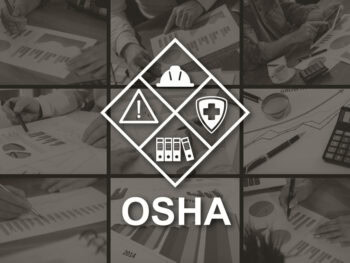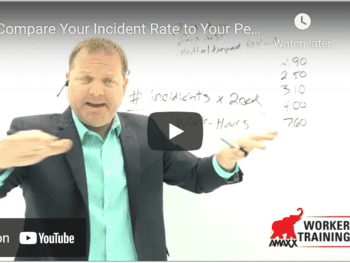Industry is seeing an unprecedented increase in whistleblower driven enforcements. OSHA has been hiring at an increased pace and announcing enforcement actions regularly.
Expectations and Actions
OSHA is putting increased effort into whistleblowers. It is an efficient way for them to find industry members who are cutting corners or exposing workers to unsafe conditions. While OSHA is adding compliance officers at a high rate, they could never hire enough to conduct inspections at even a fraction of the businesses they have jurisdiction over. I am somewhat critical of this action. However, since it is an efficient method to conduct enforcement; we can expect to see even more of it. There are many controllable actions you as the employer can take that will lessen the chance this type enforcement will impact your business.
What can we expect from OSHA? This is difficult to accurately quantify. However, OSHA compliance officers, other safety professionals, and OSHA itself by its actions and its own press suggest we are in for a level of enforcement never before seen. Plainly the decision has been made that preventable workplace injuries and fatalities are unacceptably high. While I agree with this, I would like to see those who are found in violation be required to spend more on safety rather than be fined. The high amount of OSHA fines has the reverse action in my professional opinion. Taking many thousands of dollars from a firm puts many in a position to not be able to afford the positive changes required.
While OSHA, like most federal agencies, does have its problems, for the most part OSHA guidelines provide a base outline to properly administer safety. If you are in compliance and do it efficiently, following the OSHA guidelines (as well as industry standards),and have unwavering management commitment will provide a defense against OSHA inspections, a good return on money spent, keep your employees safe, and promote an excellent negligence defense to workplace accident legal actions.
Your Defense Against Whistleblowing
How do we defend against OSHA promoting Whistleblowing? First if you have a good safety program that is administered correctly, you have little to be concerned with. A complete safety program is much more than just PPE, a fancy written manual, or memos. A complete program should, as well, promote the communication from the bottom to top of the management chain. (Note that direction).
With an effective safety program, employees feel that they can express any concerns to their immediate supervisor and/or safety committee member and receive a quick resolution to the situation they feel needs attention. This can only be accomplished if procedures are in place so that if the lowest level of employee squeaks it is heard rapidly up the management chain as far as required for quick resolution.
In fact a solid safety program will recognize employees that do so with praise or incentives. This is the area of safety where human nature comes into play. If your safety program is this evolved it is unlikely that any employees will feel the need to become whistleblowers.
Exceptions to the Rule
There are exceptions to this of course. Unfortunately a small percentage of employees are mal -adjusted, ill content, or have a bad outlook no matter how acceptable the working conditions are. As such this is where additional training of your supervisors in these specific areas of behavioral sciences can, along with the company probation period, attempt to weed out this type problem before it becomes permanent. If your program is thorough and all levels of management are properly trained, if an employee does call in a complaint, OSHA will see the complaint for what it is. When a worker initiates the first contact, OSHA officers are trained to ask pointed questions to validate a situation. Again, if you have your house in order, the complaint may well show OSHA that your firm is in a ready state of compliance. If a site visit results, it will most likely not be without advanced notice and your firm will represent a safe and compliant company.
Stay the Course on Safety
I am fond of an old adage about safety that I feel is pertinent here. It goes like this: “It is not easy but it is simple” If you have initiated a safety program in the past and it has degraded a bit, do not be discouraged. You will not be the first to have to seemingly start from the beginning again. Take heart in one aspect, I can promise no actions taken in the past were for naught. Any past training or commitment have life left in them. Remember the number one factor in any safety program is consistent management commitment.
Remain committed, retain professional help if needed, and it will pay off. Many safety vendors are fond of touting the studies that show that many dollars are returned for every dollar spent on safety. What is often left out, in an attempt to sell you some new hot product, is that the money must be properly spent. Tossing dollars at random targets may give short lived results. However, to realize the real benefits that go far beyond safety and will result in increased worker moral, production and profits requires specific actions that require many repetitions. This is where being persistent and continuing the commitment will pay off.
Conclusion
Bottom line here: consistency through repetition and unwavering management commitment will see you arrive at a point at which your overall safety and risk program becomes self correcting. It is one of those things that may be hard to visualize for management that has not yet experienced this level program. If you follow through remain committed you will arrive sooner than you can imagine. When you are there you will recognize it. It is truly a very special day.
Editor Michael B. Stack, CPA, Director of Operations, Amaxx Risk Solutions, Inc. is an expert in employer communication systems and part of the Amaxx team helping companies reduce their workers compensation costs by 20% to 50%. He is a writer, speaker, and website publisher. www.reduceyourworkerscomp.com. Contact: [email protected].
WORKERS COMP MANAGEMENT MANUAL: www.WCManual.com
Do not use this information without independent verification. All state laws vary. You should consult with your insurance broker or agent about workers comp issues.
©2012 Amaxx Risk Solutions, Inc. All rights reserved under International Copyright Law. If you would like permission to reprint this material, contact us at: [email protected].















